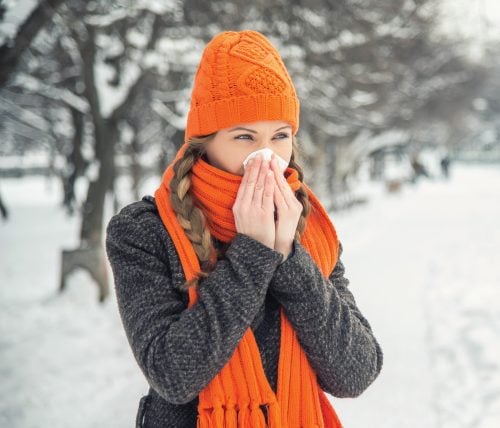
Following northern hemisphere trends, we could be in for a bad flu season. What’s the best advice for reducing your risk this year?
You wake up with a tickle in your throat and it hurts to swallow. You feel lethargic, you sense the beginnings of a headache and you’re sweating, despite the cold weather. Uh-oh… It’s estimated each year up to 20 per cent of New Zealanders get influenza. You may know some of those people who spent days lying on their beds; the ones who will tell you they have never been so sick in their lives. Others are so ill they are hospitalised. And each year a mall number die.
That’s not to say that every sniffle will lead to influenza, commonly known as the flu. But even a bad cold can leave us feeling miserable. So how can we protect ourselves against these winter ailments or lessen the effect if we do succumb?
The recommendations and remedies are so numerous (and sometimes downright strange… from lizard soup in Hong Kong to wet socks in England and pickled plums in Japan), it’s hard to know which advice, if any, to take seriously. We take a look at some of the ways you really can help boost your immunity or soothe your symptoms this season.
What to do to build a barrier against the germs
Nurture your immune system
Fighting off a cold or flu virus is easier if you already have a strong immune system. “To minimise your chances of catching flu this winter, it’s important you keep your immune system in top condition,” GP Dawn Harper says. “That means eating a well-balanced diet that provides plenty of vitamins and minerals and reducing your stress levels by getting enough sleep and exercising regularly.”
It’s best, where possible, to get vitamins and minerals from your diet rather than supplements. Particularly beneficial are fruits and vegetables crammed with immune-boosting vitamin C (such as citrus fruits, strawberries, kiwifruit, broccoli, kale and spinach).
“Vitamin C can’t stop you catching a cold, but if you’ve had a good supply in your diet, when you do get a cold it may reduce the severity of your symptoms,” nutritionist Amanda Ursell says.
Additionally, vitamin D may help protect us against colds and flu. According to recent research from Queen Mary University of London, it works by boosting levels of a natural antibiotic-like substance in the lungs. Vitamin D is made in the skin from exposure to sunlight, but it’s hard to get enough via the skin to see us through winter. It’s also found in a few foods, such as oily fish, eggs, milk and liver, as well as fortified milk and milk substitutes, but you could consider a daily supplement to boost levels if you are deficient.
Block the bugs
The linings of your nasal passages, throat and lungs act as physical barriers to infection. “If you’re eating in a way that keeps those membranes as healthy as possible, you’re less likely to become vulnerable,” Ms Ursell says. “Protein (such as lean meat, fish, eggs, milk, pulses or tofu), in particular, is vital for maintaining the membranes.” She also recommends a healthy intake of vitamin A, which helps maintain and renew tissue. You can boost your intake of this vitamin by eating plenty of carrots, dark green leafy vegetables, mangos and fresh apricots.
Wash germs away
As well as following a healthy diet, there are other precautions to take. If you’re around peoplewith a cold or flu, wash your hands frequently. Sneezing and coughing can spread colds, as can touching a surface with a virus on it then touching your mouth, eyes or nose. Ideally, steer clear of sick people. And wash your hands often with soap for at least 20 seconds, then dry very well. Use an alcohol-based hand sanitiser if soap and water aren’t available.
Have a flu jab
A flu vaccination is available free to people who are most at risk. This includes pregnant women and everyone 65 years or older as well as younger people with specific diseases and with weakened immune systems.
The Ministry of Health recommends a flu shot even for the fit and healthy. Not only can they get the flu and become seriously ill, they can spread it to others. Although people with underlying medical conditions, such as asthma or diabetes, are most at risk from flu-associated complications, previously fit and healthy people have ended up in hospital or died from influenza.
By getting the jab, you’ll help to protect others, too. Each year the World Health Organization assesses the current strains of flu circulating and recommends which flu strains should go into the vaccine. In the 2018 vaccination, which has been available since April, two of the four influenza strains are new. If you haven’t had a flu jab yet, it’s not too late. It’s really important that as many people as possible get their jab, as this is the best way to stop the flu circulating.
What to do if you fall ill
Go for comfort in a bowl
By all means, turn to comfort food if you feel under the weather, but this doesn’t have to mean unhealthy choices. A hearty soup can tick both the comfort and health boxes and is a traditional remedy in some cultures. It’s an old Jewish custom to eat chicken soup when you’re ill. One study found chicken soup might be anti-inflammatory, and the addition of loads of veges will help that. The steam also helps to clear nasal passages. And even though your own soup will be warming and comforting, don’t overlook the psychological effect of giving or receiving a comforting soup. What better way to share the love with someone who’s not well?
Keep sipping
Keep well hydrated with water, and some diluted fruit juices and herbal teas if you like. Avoid alcohol altogether and limit caffeinated drinks. Hot drinks can help ease your symptoms.
Fill in the gaps
If you’re off your food for a period of time, you may want to use a meal replacement powder to ensure you’re getting all the vitamins and minerals you need.
When it comes to reducing symptoms, echinacea may get lots of good press, but the most compelling studies involve zinc. A Finnish study found that taking zinc lozenges may shorten the duration of a cold but larger, high quality trials are needed to replicate these results and those of similar studies. It’s worth noting that too much zinc has been associated with side effects such as nausea and diarrhoea.Try this Hot and spicy chicken noodle soup recipe. Open-air exercise, such as jogging, is fine if your symptoms aren’t too bad. However, if you have a fever (38°C or above), you should stay at home.
Is it a cold or flu?
The terms may sometimes be used interchangeably, but the common cold and flu are caused by different viruses. Cold symptoms affect the upper respiratory tract, causing a runny nose, sore throat and dry cough. You can usually keep going with the aid of medication. There’s no set advice on whether to go to work with a cold, but if you’re coughing and sneezing, it makes sense to practise good hygiene etiquette to avoid spreading the virus to others. Once upon a time we were taught to cough or sneeze into our hands, but these days, if you don’t have a tissue at the ready, coughing or sneezing into the elbow pit is the way to go to help avoid spreading your germs.
When you have real flu, you’ll need to rest at home. Many of the symptoms will be the same, but you’ll also have a high temperature, aching body and exhaustion. How do you tell if it’s flu? GP Rob Hicks says: “See a $10 note on the floor and if you’re able to pick it up, you haven’t got flu. When you have flu, you’re knocked for six.”
Got a cold?
See your GP if:
- Your symptoms last for more than three weeks or suddenly get worse
- You’re having difficulty breathing
- You develop chest pain
- You cough up blood-stained mucus
Got the flu?
See your GP if:
- Your symptoms don’t improve after a week or you develop a complication (bronchitis or pneumonia, for example, must be treated)
- You’re over 65
- You’re pregnant
- You have a long-term medical condition or weakened immune system
Article sources and references
- Hemila H et al. 2016. Zinc acetate lozenges for treating the common cold: An individual patient data meta-analysis. British Journal of Clinical Pharmacology 82 1393-8https://www.ncbi.nlm.nih.gov/pubmed/27378206
- Martineau AR et al. 2017. Vitamin D supplementation to prevent acute respiratory tract infections: Systematic review and meta-analysis of individual participant data. BMJ 356:i6583https://www.bmj.com/content/356/bmj.i6583
- Ministry of Health. Influenza, health.govt.nz Accessed April 2018https://www.health.govt.nz/your-health/conditions-and-treatments/diseases-and-illnesses/influenza
- Ministry of Health. Vitamin D, health.govt.nz Accessed April 2018https://www.health.govt.nz/your-health/healthy-living/food-activity-and-sleep/healthy-eating/vitamin-d
- Ministry of Social Development. Keeping warm and healthy this winter, msd.govt.nz Accessed April 2018https://www.msd.govt.nz/about-msd-and-our-work/publications-resources/brochures/keeping-warm-healthy.html
- Rennard BO et al. 2000. Chicken soup inhibits neutrophil chemotaxis in vitro. Chest 118:1150-7https://www.ncbi.nlm.nih.gov/pubmed/11035691
- Science M et al. 2012. Zinc for the treatment of the common cold: A systematic review and meta-analysis of randomized controlled trials. CMAJ 184:E551-61https://www.ncbi.nlm.nih.gov/pmc/articles/PMC3394849/
www.healthyfood.com











